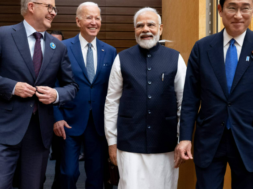
Targeting BRI’s debt traps: Quad works to liberate countries from China’s dragnet
Virendra Pandit
New Delhi: Announcing a mechanism to subtly pull out debt-trapped countries from China’s now slowed down Belt and Road Initiative (BRI)—which promised to develop over 1,700 infrastructure projects in dozens of countries in Asia, Africa, and Europe at a cost of over USD 200 billion—the four-nation Quadrilateral Security Dialogue (Quad) on Tuesday deepened cooperation on infrastructure development in the Indo-Pacific Region, help countries, and earmarked USD 50 billion for this aim over the next five years.
The Quad members—the US, India, Japan, and Australia—agreed to deepen cooperation on infrastructure, critical to driving productivity and prosperity in the Indo-Pacific Region, and share a commitment to addressing debt issues, which have been exacerbated by the coronavirus pandemic in many countries.
With this strategy, the Quad group expects to pull out the debt-strapped countries from China’s BRI dragnet.
Prime Minister Narendra Modi, US President Joe Biden, Japanese Prime Minister Fumio Kishida, and his Australian counterpart Anthony Albanese attended the second in-person Quad Summit, held in Tokyo.
In a comprehensive, joint statement, they said the Quad partners pledged to work closely with partners and the region to drive public and private investment to bridge gaps. To achieve this, Quad will provide over USD 50 billion of infrastructure help and investment in the Indo-Pacific Region over the next five years.
“We will strengthen the capacities of the countries in need to cope with debt issues under the G20 Common Framework and by promoting debt sustainability and transparency in close collaboration with finance authorities of relevant countries, including through the Quad Debt Management Resource Portal, which comprises multiple bilateral and multilateral capacity-building help”.
Welcoming the meeting of the development finance institutions and agencies of the four countries on the sidelines of the Quad Summit, the leaders said they are working closely with experts, the region, and each other to link their toolkits and expertise to better connect the Indo-Pacific.
“We will further deepen collaboration and pursue complementary actions in identified areas, such as regional and digital connectivity, clean energy, and climate resilience including disaster resilience in energy-related facilities that reflect the region’s priorities, including the ASEAN Outlook on the Indo-Pacific, to contribute to sustainable and inclusive growth in the region.”
The Quad leaders also recognized an urgent need to take a collective approach to enhance cybersecurity.
To deliver on the Quad’s vision for a free and open Indo-Pacific, they pledged to improve the defense of their nations’ critical infrastructure by sharing threat information, identifying and evaluating potential risks in supply chains for digitally enabled products and services, and aligning baseline software security standards for government procurement, leveraging their collective purchasing power to improve the broader software development ecosystem so that all users can benefit.
The Quad partners will coordinate capacity-building programs in the Indo-Pacific Region under the Quad Cybersecurity Partnership, and will start the first-ever Quad Cybersecurity Day to help individual internet users across our nations, the Indo-Pacific region, and beyond to better protect themselves from cyber threats.
They will share space-based civil Earth observation data and provide a “Quad Satellite Data Portal” that aggregates links to their respective national satellite data resources. They will also work together to develop space applications, including in Earth observations, provide capacity-building support to countries in the region, and partner in using space capabilities to respond to extreme precipitation events.
The Quad will focus on harnessing critical and emerging technologies to enhance the prosperity and security of the region.
In 5G and beyond, while welcoming the Prague Proposals on Telecommunications Supplier Diversity, the Quad nations will advance interoperability and security through the signature of a new Memorandum of Cooperation on 5G Supplier Diversification and Open RAN.
They said they have mapped the Quad’s capacity and vulnerabilities in global semiconductor supply chains and welled leverage their complementary strengths to realize a diverse and competitive market for semiconductors.













